Making pickles
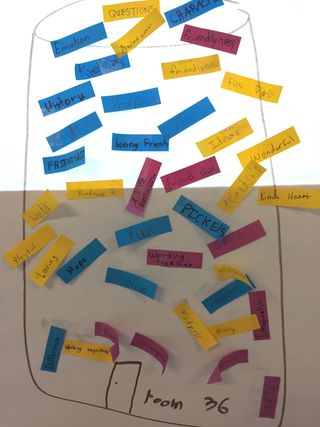
Opal School exists not only to influence its immediate community: It lives to provoke change far and wide. We know that our workshops catalyze change – but only rarely do we get a window into the ripples. Below, you’ll read how Erin Baker brought some of the juice from the Reading the World workshop back to her school to open new possibilities for her class. This post first appeared on her blog.
How do you make pickles?
by Erin Baker
Earlier this week, I mentioned that I would share with all of you more about the conference I attended entitled, Reading the World. Peter Johnston, the special guest who wrote the book, Opening Minds: Using Language to Change Lives, had said the following quote…
Sometimes a single word changes everything… Because of our embodied histories, much of the time our own responses to children are automatic. We open our mouths and our parents or previous teachers come out. Changing our talk requires gaining a sense of what we are doing, our options, their consequences, and why we make the choices we make… the language we choose in our teaching changes the worlds children inhabit now and those they will build in the future.
This quote led me to reflect more on my own teaching, (as well as parenting) and I returned to school with a greater intention of how to choose my words carefully with the children. I want to support them to work with one another, and particularly with how to help them understand and digest these larger complicated concepts about thinking like a historian and considering multiple perspectives.
While visiting a 4th and 5th grade classroom at Opal School, where I taught for many years before coming to OES, I stumbled on a quote on the wall from one of my former 1st grade students, now a 5th grader.
He said, “Making pickles is like making a culture. It’s like the brine that you soak the pickles in determines the flavor of the pickles, it’s just like that with people. Whatever you grow up in shapes how you believe.” -Devin age 10
I asked Devin if I could borrow his metaphor of the pickle making to share with my 3rd Graders. He said yes.
-I wondered if this metaphor might help them understand more about the different cultures of Pioneer, Fur Trapper, Native American, and African American Pioneers.
– I wondered if using this powerful image of pickling would help me, to help the children to open up to new possibilities, encourage creativity, and then build connections between one another and the learning we are engaged in.
I want to remind you as you read the children’s conversation to remember that not everyone is a verbal processor and that some of the children share their thinking around this issue through their writings, drawings, and in the acting and script writing we have been doing in class. I share this conversation to share with you how the children build off of one another’s ideas, to illustrate how this metaphor allowed them to make amazing connections that not all of them had made before. I want you to notice how the power of a joyful, compelling metaphor was able to open up thinking, and how it represents the “brine” we are creating in our community. This way of talking and listening is a part of our classroom culture. We have conversations like this on a regular basis and everyone is honored in our “brine” to think and process these ideas in their own way. I’ll be curious to see what you all notice too!
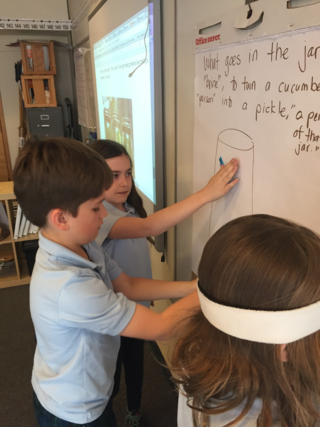 We started the conversation by talking about our own jar, our own brine. Here is what the children said it was filled with…
We started the conversation by talking about our own jar, our own brine. Here is what the children said it was filled with…
Wonder, friendship, loving, working together, difference, history, questions, emotion, character, stories, fun, friends, imagination, helpfulness, hope, playful, ideas….
Jia said: “What’s in the jar represents what we’ve learned, our friendship, how we came into a community.
Then I asked them: How do you make pickles? What is a brine? How might making pickles be like creating a community?
How is making pickles and the brine, like making a community?
Leoni: Instead of pickles I am thinking more of people. At the beginning of the year people were shy and not really willing to make friends. As you stay in this classroom and eventually you get happiness, kindness, friendship, kindheartedness, wonderful and you turn into this person who is kind of different than the beginning.
Will: I think it is like a life cycle, you start the beginning of the year as a cucumber. It takes a while to get into the groove and know where everything is and make new friends and that’s when you go into the jar, no spices no sweetness. By the the middle of the year you’ve gotten into the groove, you’re good and that’s when you get cooked. Then it’s toward the end of the year and you’ve had spicy and sweetness and you turn into a new person. By the end of the year you turn into a pickle, you are a completely different person and you know new things and have new friends and know new experiences.
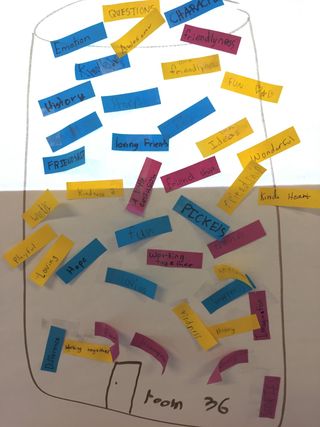
Ben: Just like in my drawing, just like Will said, at the beginning of the year you start out as a cucumber, you don’t know that much, you have friends and people you know and you want to stay with them and so I called them Cucumbers from the Island of Garden and then there are other people who have already been at this school and already know where everything is and know everyone here and so they are already pickles from the Island of Learning and I drew a machine and so when the cucumbers go through it it is kind of like the year and at the end of the year of being in the brine you come out at pickles, and those kids that were new are a new kind of pickle.
Cat: What happened to the other people that were already there?
Ben: The cucumbers are like the new people.
Uma: So what do you guys think would happen if every year they became a pickle because every year you go to school, so when would you become a different kind of pickle?
Ms. B: Wait, there are different kinds of pickles? Would every pickle in the jar taste the same?
All: (A resounding- NO!)
Will: Every other single person is different and has different knowings and different experiences.
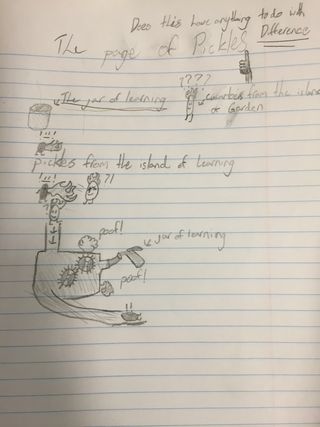 Ms. B: What are the things that are going in the jar that make different kinds of pickles? I heard experiences, feelings… differences, wonder..
Ms. B: What are the things that are going in the jar that make different kinds of pickles? I heard experiences, feelings… differences, wonder..
Peter: More than one kind of cucumber can come from the same plant, like your brothers and sisters.
Lily: It’s like your family puts stuff in the jar too!
Ben: Soren and Uma just gave me an idea, the Jar of Learning, it’s the brine and you need that to work the machine because you can’t make a pickle with no brine, each different jar has a different personality and you learn something new every year and so every year there is a new jar of learning for you so you keep getting new personalities as you learn things.
Uma: Wouldn’t it be your entire time you are in school you are in the brine and then when you graduate is when you actually become a pickle, you have to be there for a long time to actually become one.
Ms. B: When you make pickles how long does it take for them to be ready to eat?
Uma/ Ada: A long time! Like 2 months.
Ada: I thought about the spices and sugar and salt all those things are the personalities of all these different people and they get mixed into you and when you come out you are completely changed.
Victoria: I thought of it as like a family, like every single person in it has a different job. Every different cucumber has different ingredients added to it in the community. Without every single one of those people or jobs in the community, it wouldn’t be what it is.
Catherine: Our class is full of wonderful things, and it is also full of things we need to work on. I don’t think any class if full of pure perfect. Every class has it’s things it needs to work, every class has its problems.
Will: Every class has its’ own jar.
Catherine: Yeah, and we can fix those problems but you know all these things in the jar are good things that we need to learn. I think we need to add some of those things to our jar.
Flynn: It reminds me of that video we watched about empathy with the fox and the bear. I felt like the brine was the empathy you are giving to someone else, the friends you are giving to them and the feelings you are giving to them and then they become a part of your community and they are getting help from the brine. What’s the stuff in between the pickles? I thought of that there might be a few problems in there, might not always be happy stuff, you might meet someone really spicy and you are really suite and then you might have a fight.
Lily: Every class has it flaws and there is no where to hide things, they will all come out.
Catherine: That’s ok.
Lily: It’s definitely okay.
Catherine: As long as you try..
Ms. B: So as you are listening to this conversation, what is this pickling thing all about, what are we talking about?
Soren: If I have someone else in my class or my grade that was my sister or brother, well the teachers are a part of the brine too and they can change how you look at things and so depending on your teacher, it’s not just your classmates who put stuff in the jar, your teacher does too.
Ms. B: Do I put a lot of stuff in that jar?
Ben: I think there are always 2-3 pickles that don’t exactly… they were originally meant to be bossy or something like that, so there are 2-3 pickles that always think there own thing no matter what.
Will: Maybe they had different amounts of sweetness or salty.
Ms. B: So what I am wondering now is if we think about what goes into our community jar, what goes into some of these other jars….
Lots of voices: Wow! Oh cool!
Ms. B: What goes into the brine for these different groups of people?
Victoria: For every single one, difference! They think different ways they have different things that are important to them. They all have the desire to survive and get more beaver.
Theo: I know something else, they all have different cultures.
Flynn: They all have different DNA or RNA.
James: What is RNA?
Will: They all come from different backgrounds, they have different schemas.
Many voices: They all have different brines!
James: The Hudson’s Bay Company told them what to do if they were fur trappers.
Soren: The brine that goes into the Chinook and the Kalapuyaa, they never thought that you could buy the land and keep it. They thought that if you got there that other people would come too but you just had to share it. The brine of the Pioneers was that if I buy the land then I get to keep it and it is my land.
Victoria: They didn’t buy it they claimed it.
Lily: They just took it.
Aaren: All of them needed courage in their jar.
Ms. B: What went into their jar that gave them courage?
Will: There are different spices that give courage?
Catherine: If they have a problem they use courage to fix it.
Leoni: People who face their fears.
Soren: They have nothing to lose.
Peter: It depends on what plant they came from.
Charlotte: They could be people who try something new.
Victoria: Are you sure that all of these groups are different and come from different jars?
Ms. B: Hmm… interesting idea.
Victoria: Because we all know that Pomp came from two different plants, not just one kind of plant.
Ms. B: That’s right, that’s what we have been writing about in our play about what happens when all of these cultures spill into each other.
Lily: Pomp, even if he chose to be a fur trapper, he would still have a part of him that is Native American.
Jonathan: Your genes go into the jar.
Flynn: Yes, your genetics definitely go into the jar. DNA, RNA!
Ms. B: Yes and, what does that tell people in the jar to do then, what to believe, how to behave…
Leoni: Creation stories, you would have grown up hearing them.
Flynn: Culture
Will: That we have a different creation story than you.
Victoria: They all believed differently.
Ada: The Chinook believed they came from Thunderbird.
Leoni: The Kalapuuya had different creation story that they came from coyote or from the wolf.
Peter: They would have had knowledge.
Quinny: They all have different sayings. Languages.
Ada: Everyone spoke Chinook wa wa, but they didn’t all have the same first language.
Ms. B: So would your language have helped determine what kind of pickle you would be?

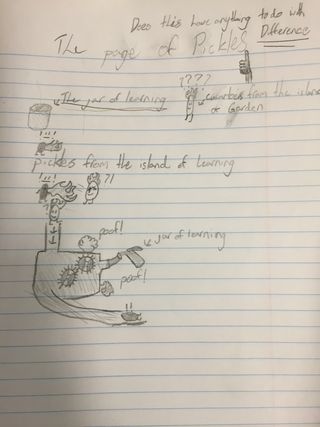
This is such a powerful metaphor, Erin and, as always I am so impressed by the level of dialogue and the way even the youngest of the Opal community listen to understand one another and work to extend their own thinking; not in a ‘one-up-you’ way but in a genuine, delighted way:) I am wondering how this idea of a brine has evolved since this discussion… I picked up on it at Summer Symposium and have been thinking about it alot as we at Ochoa are working through Gunilla Dahlberg’s Ethics and Politics book. I am finding the book to be quite a challenge to read but am so motivated by the ideas that I am plugging away:) In chapter three she describes several ‘ethics’ inclucing an ethics of care and the ethics of an encounter. Please let me know whether you are familiar with this book and this idea of ‘alterity’ or ‘Otherness’.
Thanks for leaving the comment, Julie!
I don’t know the Ethics and Politics book, but it sounds like a great one – I’ll add it to my list! I don’t think Dahlberg has been to Opal School yet: I hope she can come our way. The impact of calling these “ethics” has important implications to consider – and it’s a strong link to next year’s Symposium theme of “Play, The Arts, and Education for Democracy.”
To clarify: The children who are featured in this post are not Opal School students – Erin is a former Opal School teacher who now teaches at a different Portland school. We include it here because Erin was inspired by the brine metaphor she encountered during her time at the April workshop and found a reason to bring it back to her community. It’s exciting to me that Opal School Online can be a place for this kind of cross-pollination.
Would you be interested in writing a post about how the ideas you’ve played with in Portland have sparked new lines of inquiry at Ochoa? I hope so!
I hope you’re having a wonderful summer – and finding some respite from the heat –
Matt